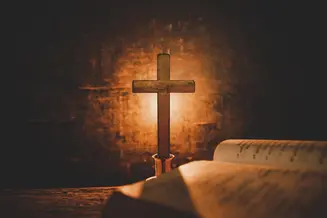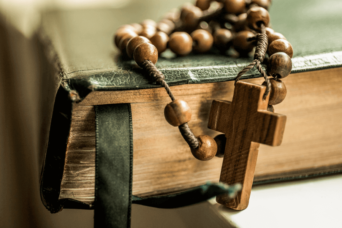The Lord Is My Shepherd: Psalm 23 Meaning
August 2022
The book of Psalms written by King David under the influence of the Holy Spirit all have a personal signature attached to each of them. Almost everything David wrote in his verses flowed from his life experiences. And because of that, they make very beautiful and heartfelt prayers when said directly to God.
We can all relate to many of his struggles and the joy depicted in the book of Psalms. This is because, just like he is, we are all human beings with flaws chosen by God to fulfill divine purpose.
Psalm 23 in particular has been the inspiration for many hymns, songs, and prayers. It is one of the most popular psalms on earth, so people tend to become overly familiar with it and say the words without the meaning in mind.
However, meditating on and praying Scripture back to God increases our awareness of His love and faithful commitment to us.
That’s why this piece aims to help you understand the Psalm 23 prayer better.
What Does Psalm 23 Say?
David writes,
“1. The Lord is my shepherd; I shall not want.
2. He makes me lie down in green pastures.
He leads me beside still waters.
3. He restores my soul.
He leads me in paths of righteousness for his name’s sake.
4. Even though I walk through the valley of the shadow of death, I will fear no evil,
for you are with me; your rod and your staff, they comfort me.
5. You prepare a table before me in the presence of my enemies;
you anoint my head with oil; my cup overflows.
6. Surely goodness and mercy shall follow me all the days of my life,
and I shall dwell in the house of the Lord forever.”
What Does “The Lord Is My Shepherd” Prayer Mean?
To fully understand the richness of the Psalm, we need to dissect each verse and deduce its meaning;
“The Lord is my shepherd; I shall not want..”
A shepherd’s duty is to look after the sheep and be responsible for their welfare. David likens God to a shepherd. He had been a shepherd too, so he understood quite well how similar the shepherd’s job of caring for his flock and God’s job of caring for His people were. This paints a picture of the confidence David had in God’s ability to provide for and take care of him, and for us today.
“… He makes me lie down in green pastures. He leads me beside still waters…”
Like a shepherd leads his sheep to good pastures and clean water, God led David in all his endeavors and gave him victory every time. He also leads us to the best opportunities and showers us with all His choicest blessings. He leads us away from things and decisions that will end badly for us. He’s concerned about us.
“… He restores my soul…”
David grew weary a lot of times, and God was there for him. When we are exhausted, burnt out, or broken by life’s circumstances, God refreshes us and supplies us with the strength to go on.
“…He leads me in paths of righteousness for His name’s sake…”
Even the ability to walk in righteousness comes from Him, from His Spirit. God understands that we can’t keep His commands by ourselves, so He gives us the grace to obey Him and live free from sin by His Spirit living within us.
“… Even though I walk through the valley of the shadow of death, I will fear no evil, for you are with me…”
This shows absolute confidence in God’s protection. God has power, even over death. There wasn’t a literal valley where the shadow of death lived in those times, it was David’s metaphor for really dangerous situations.
He knew that God loved him, and would never let harm come his way. Even today, we do not walk alone. God promised to be with us, even till the end of the age (Matthew 28:20).
“…your rod and your staff, they comfort me…”
A rod here symbolizes the Lord’s strength and protection. Shepherds at that time used them to fight off wild animals and keep count of sheep. This means that God protects us and is intentional about each of us. He is so patient and kind.
A staff, on the other hand, was used to direct the sheep and keep them from wandering. It is a symbol of God’s guidance and loving-kindness towards us as His children.
When David said that the rod and staff comforted him, he meant that God’s protection and guidance kept him going.
“…You prepare a table before me in the presence of my enemies…”
Preparing a table in front of his enemies not only means that God prospered David even as his enemies looked on, but he gave him protection from them.
In David’s time, it was also part of a host’s duty to offer protection to his guests. This means that despite the wiles and devices of our enemies, God will not only shield us from them but bless us amid their attacks.
“…you anoint my head with oil; my cup overflows…”
In David’s time, it was a custom for a host to show hospitality and respect to an honored guest by anointing their head with oil. The oil was often mixed with fragrant perfumes to refresh and soothe weary travelers. (Luke 7:46).
Oil here also signifies gladness like Psalm 45:7 says. David considered himself an honored guest in God’s house or presence. So his reference to his head being anointed with oil meant that even in the threat of the presence of his enemies, (verse 5a) he would not be afraid but be glad because of God.
“…Surely goodness and mercy shall follow me all the days of my life, and I shall dwell in the house of the Lord forever.”
“Surely” means definitely, without fail. This last verse sums up everything the Psalm 23 prayer says. It holds David’s assurance of God’s presence, provision, care, and loving-kindness for as long as he lived and even beyond.
When you pick up your Bible and read up until this particular verse, know that God doesn’t go back on what He has promised to do. He will fulfill His part of His covenant towards you continually, without end.
Final Thoughts
The Psalm 23 prayer is more for us than it is for God. God is already aware of everything written in the verses and already does them for us lovingly, but circumstances make us forget sometimes just how much God loves us and does for us.
David penned down this Psalm to serve as a reminder to himself, and to all who would come after him that we serve a God who takes care of us as a shepherd who cares for his flock. In hard times, in moments of grief, anxiety, pain, depression, or loss we say this prayer to remind ourselves that the Lord, Maker of Heaven and Earth, He who knows the beginning from the end, is our shepherd. And because of that, we most definitely shall not want. He watches over and cares for us.

In this article:




